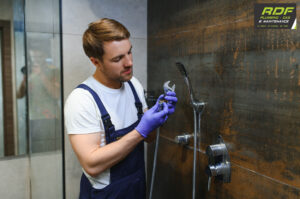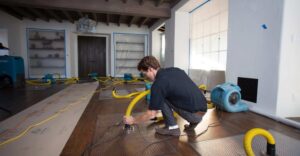
PC-maxresdefault
Plumbing problems – they’re the kind of thing that can turn a perfectly good day upside down in an instant. A leaky tap might seem minor, but left unchecked, it can lead to bigger issues and a significantly higher water bill. Burst pipes, blocked drains, and faulty hot water systems? Those are the kinds of headaches that require immediate attention. That’s where finding the right help from a professional who offers residential plumbing solutions in the local area becomes essential.
But hiring a plumber isn’t always straightforward. With so many options available, how do you ensure you’re choosing a reliable and competent professional? Sadly, some homeowners learn the hard way, falling victim to dodgy workmanship and inflated prices. In this article, we’ll explore common mistakes people make when hiring a residential plumber and, more importantly, how you can avoid them. After all, a little bit of knowledge can save you a whole lot of money and stress.
1. Ignoring Licensing and Insurance
Imagine hiring someone to fix your plumbing, only to discover they’re not actually qualified to do the job. Worse yet, what if they cause damage to your property and aren’t insured to cover the costs? This is why verifying licensing and insurance is absolutely crucial. In Australia, plumbers are required to be licensed, which means they’ve undergone the necessary training and have demonstrated competence in their field. Ask for proof of their license and double-check its validity with your local regulatory body. Similarly, ensure the plumber has adequate public liability insurance to protect you from financial losses in case of accidents or damages.
2. Failing to Get Multiple Quotes
Would you buy the first car you see at a dealership without comparing prices? Probably not. The same principle applies to plumbing services. Getting multiple quotes allows you to compare pricing and services offered, ensuring you’re getting a fair deal. Don’t just focus on the lowest price, though. Consider the scope of work included, the quality of materials used, and the plumber’s experience. A significantly lower price might be a red flag, indicating substandard workmanship or hidden costs down the line.
3. Neglecting to Check References and Reviews
In today’s digital age, online reviews and testimonials are invaluable resources for assessing a plumber’s reputation. Take the time to read reviews on platforms like Google, Yelp, or even the plumber’s own website. Pay attention to both positive and negative feedback, looking for patterns or recurring issues. Don’t hesitate to ask for references from past clients. A reputable plumber should be happy to provide you with contact information for satisfied customers.
4. Not Asking About Experience with Similar Jobs
Plumbing is a broad field, and not all plumbers have experience with every type of job. If you need a specialist job done, like fixing a gas leak or installing a complex drainage system, it’s essential to ask about the plumber’s experience with similar projects. A plumber who primarily handles routine repairs might not be the best choice for a more complex or specialised task. Enquire about their expertise and ask for examples of previous work they’ve completed.
5. Overlooking Communication Skills
Effective communication is key to a successful plumbing project. A good plumber should be able to clearly explain the problem, outline the proposed solution, and answer your questions in a way that you understand. They should also be responsive to your calls and emails and keep you informed of any changes or delays. If a plumber struggles to communicate effectively, it could lead to misunderstandings, frustration, and ultimately, a less-than-satisfactory outcome.
6. Not Getting a Written Contract
Never rely on verbal agreements when it comes to plumbing work. Always insist on a written contract that outlines the scope of work, the materials to be used, the total cost, and the payment schedule. A written contract protects both you and the plumber, providing a clear record of the agreed-upon terms. Read the contract carefully before signing it, and don’t hesitate to ask for clarification on anything you don’t understand.
7. Making Payment Before the Job is Completed
While it’s common to pay a deposit upfront, avoid making full payment until the job is completed to your satisfaction. This gives you leverage to ensure the work is done properly and that any issues are addressed promptly. Inspect the work carefully before making the final payment, and don’t be afraid to raise any concerns you may have. A reputable plumber will be happy to address your concerns and ensure you’re completely satisfied with the results.
8. Ignoring Red Flags
Trust your gut instinct. If something feels off about a plumber, it’s probably worth investigating further. Red flags might include a plumber who is evasive, unprofessional, or who pressures you into making a quick decision. Be wary of plumbers who offer suspiciously low prices or who demand cash payments. It’s always better to err on the side of caution and choose a plumber you feel comfortable with and trust.
9. Neglecting Preventative Maintenance
Plumbing problems often arise due to a lack of preventative maintenance. Regularly inspect your plumbing system for leaks, drips, and other signs of wear and tear. Clean your drains regularly to prevent blockages, and have your hot water system serviced annually. Addressing minor issues early on can prevent them from escalating into more costly and disruptive problems down the road. Think of it like taking your car in for a service – it’s an investment in the long-term health of your plumbing system.
10. Not Understanding Your Plumbing System
While you don’t need to be a plumbing expert, having a basic understanding of your plumbing system can be incredibly helpful. Knowing where your main water shut-off valve is located, for example, can save you a lot of trouble in case of a burst pipe. Familiarise yourself with the different components of your plumbing system and how they work. This knowledge will empower you to identify potential problems early on and communicate effectively with your plumber.
11. Choosing Based on Price Alone
As mentioned earlier, price shouldn’t be the sole determining factor when choosing a plumber. While it’s important to stay within your budget, opting for the cheapest option can often lead to more problems in the long run. A skilled and experienced plumber may charge more, but their expertise and quality workmanship can save you money and headaches in the long run. Think of it as an investment in the longevity and reliability of your plumbing system.
12. Failing to Ask About Warranties
A reputable plumber should offer a warranty on their workmanship and the materials they use. This warranty protects you from defects or failures that may occur after the job is completed. Ask about the warranty terms and conditions before hiring a plumber, and make sure they’re clearly outlined in the written contract. A warranty provides peace of mind and ensures you’re protected in case of any unforeseen issues.
13. Ignoring Local Regulations
Plumbing work is often subject to local regulations and building codes. Ensure that the plumber you hire is familiar with these regulations and that they comply with all applicable requirements. Failure to comply with local regulations can result in fines, delays, and even the need to redo the work. A reputable plumber will be aware of these regulations and will ensure that all work is carried out in accordance with them.
14. Not Asking About Emergency Services
Plumbing emergencies can happen at any time, day or night. Before hiring a plumber, ask if they offer emergency services and what their response time is. Knowing that you can rely on them in case of an emergency can provide valuable peace of mind. Some plumbers offer 24/7 emergency services, while others may only be available during regular business hours. Choose a plumber who can meet your needs and provide timely assistance when you need it most.
15. Forgetting to Consider Long-Term Costs
When evaluating plumbing solutions, consider the long-term costs associated with each option. A cheaper solution may seem appealing upfront, but it could end up costing you more in the long run if it’s not durable or energy-efficient. For example, installing a high-efficiency hot water system may cost more initially, but it can save you money on your energy bills over time. A good plumber can help you evaluate the long-term costs and benefits of different options and choose the solution that’s best for your needs and budget.
Avoiding these common mistakes can save you a significant amount of money, time, and stress when hiring a team that provides residential plumbing services. By doing your research, asking the right questions, and trusting your instincts, you can find a reliable and competent plumber who will provide you with quality workmanship and excellent service. Don’t underestimate the importance of finding the right professional – it can make all the difference in ensuring the health and longevity of your plumbing system. And remember, a little preventative maintenance can go a long way in preventing costly problems down the road. For any assistance with finding a skilled residential plumber, be sure to reach out to a local expert.





